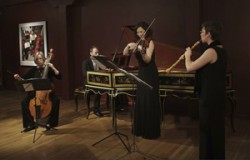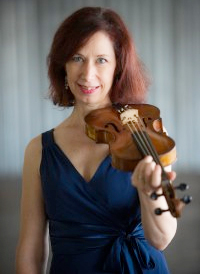by Hannah Schoepe

Les Délices, a Baroque ensemble founded in 2009 by Baroque oboist Debra Nagy, initially specialized in French music. This weekend’s concerts will feature Nagy, Baroque violinist Julie Andrijeski, viola da gambist Emily Walhout, and harpsichordist Mark Edwards. When asked about the French name via email, Nagy wrote, “It means ‘the delights.’ Délices also shares the same root as the words ‘delicious’ or ‘delicacy.’ French Baroque music is sometimes considered a fine delicacy. It is rich and diverse, but not often a central part of a listener’s diet. We wanted the opportunity to introduce this music to a wider audience.”
The program explores French patronage of Italian music. Nagy explained that “King Louis XIV, along with composer Jean-Baptiste Lully, built a strong national identity around French music in the latter half of the 17th century. As a result, patronage of, interest in, and cultivation of music and art from outside France were seen as subversive activities. It was considered risqué. As someone who doesn’t like to follow the rules, I’ve always been fascinated by this sort of ‘resistance.’”
Exploring the difficult concept of national identity in music, the performance aims to provide an insightful and enjoyable experience. The evening will begin with a Trio Sonata by Arcangelo Corelli, followed by compositions by Jean-Féry Rebel, François Couperin, Antonio Guido, Bernardo Pasquini, Michele Mascitti, and Louis-Nicolas Clérambault. Asked about the historical context of the program, Nagy said, “Corelli was essentially the inspiration for French composers trying their hand at writing Italian sonatas. Consequently, we begin our program with one of his works. Additionally, we include both solos and trio sonatas by French composers who emulated these works (Couperin, Rebel, and Clérambault).”

“Guido and Mascitti, on the other hand, seem to write mostly in their native musical language, yet at times they incorporate French elements quite effectively. Mascitti’s monumental Chaconne, for example, sounds like it could be turned into a rousing conclusion to a French orchestral suite with all of its French elements and exciting (Italian-influenced) violin writing. I love exploring it all, and trying out different possibilities.”
With great historical expertise, Les Délices is presenting a story of heritage, exploring emotions of belonging versus cultural attraction.
Published on ClevelandClassical.com October 17, 2017.
Click here for a printable copy of this article



